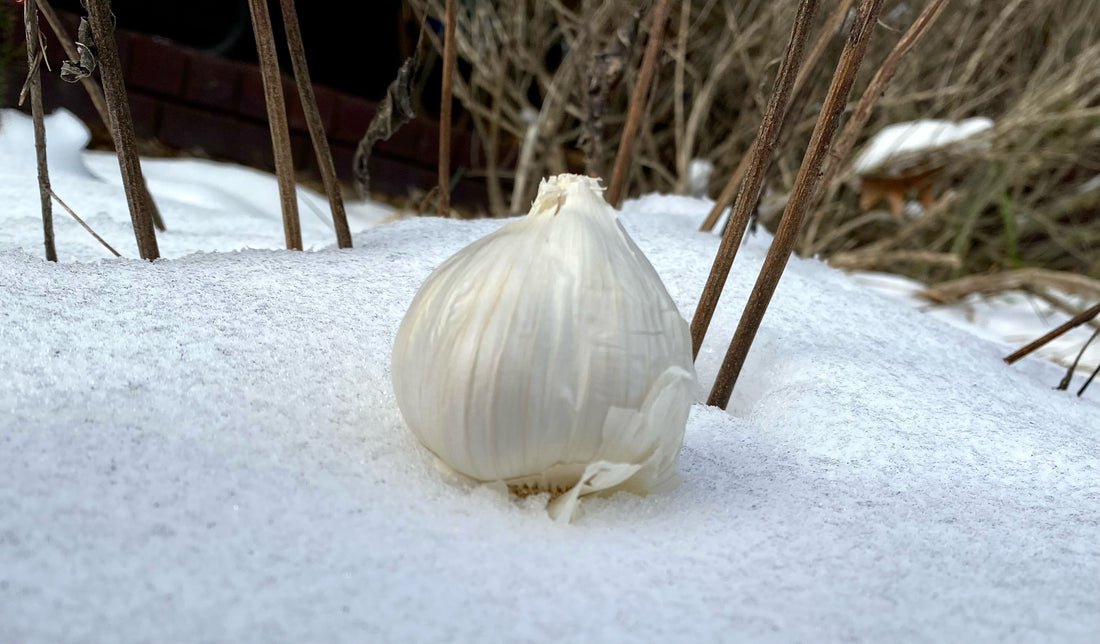
The Garlic-le (Garlic Article)
Share
Garlic. Usually utilized as an ingredient in many dishes, many people have included this plant in their diet, not even knowing the vast benefits of this food.
Garlic is a member of the Allium family, the same family as shallots, leeks, and onions.[1] It has been used by cultures all over the world in various dishes and for medicinal purposes. Some of the primary health boosting properties of garlic come from its sulfur compounds. Diallyl disulfide, allicin, and s-allyl cysteine are all present compounds in garlic, each with their own unique properties. Allicin is the most recognized, although its unique properties can only be experienced shortly after cutting, crushing, or chewing fresh garlic cloves as the compound dissipates shortly after those processes.[2] Those compounds are behind the many benefits garlic has for your health.
The antioxidant properties of garlic are known to help with many conditions. The herb has been known to help combat high blood pressure, in a 24 week study doses between 600mg to 1.5g shown to be as effective as the drug atenolol.[3] On the topic of heart health, Garlic can help lower Cholesterol. Those who have issues with high total and LDL cholesterol may consider using Garlic, as it reduces those by 10% to 15%.[4] Those same antioxidants that benefit heart health also decrease risk of Alzheimer’s and Dementia due to reduction of oxidative stress and blood pressure.[5]
Garlic has also been known to benefit the immune system. A 12 week study appears to show that supplementing with garlic reduced colds caught by 63%, and reduced length of colds by 70%.[6] A potent boost to the immune system, it also helps the body detox from heavy metals. Workers at a lead acid battery plant underwent a 4 week study, supplementing with garlic. The results showed that the lead content in the blood was lowered by 19%.[7]
The benefits of garlic for the mind and body are numerous, aiding many health concerns. Remember to keep your health in mind when supplementing your diet and mind, and to consult your doctor if you’re trying to use this supplement to cure any disease.
[1] All about allium vegetables: Onions, garlic, & others. Accessed January 7, 2022. https://www.thevegetariansite.com/health_allium.htm.
[2] Lawson, Larry D, and Scott M Hunsaker. “Allicin Bioavailability and Bioequivalence from Garlic Supplements and Garlic Foods.” Nutrients. MDPI, June 24, 2018. https://www.ncbi.nlm.nih.gov/pmc/articles/PMC6073756/.
[3] AA;, Ashraf R;Khan RA;Ashraf I;Qureshi. “Effects of Allium Sativum (Garlic) on Systolic and Diastolic Blood Pressure in Patients with Essential Hypertension.” Pakistan journal of pharmaceutical sciences. U.S. National Library of Medicine. Accessed January 8, 2022. https://pubmed.ncbi.nlm.nih.gov/24035939/.
[4] P;, Ried K;Toben C;Fakler. “Effect of Garlic on Serum Lipids: An Updated Meta-Analysis.” Nutrition reviews. U.S. National Library of Medicine. Accessed January 8, 2022. https://pubmed.ncbi.nlm.nih.gov/23590705/.
[5] C;, Borek. “Garlic Reduces Dementia and Heart-Disease Risk.” The Journal of nutrition. U.S. National Library of Medicine. Accessed January 8, 2022. https://pubmed.ncbi.nlm.nih.gov/16484570/.
[6] P;, Josling. “Preventing the Common Cold with a Garlic Supplement: A Double-Blind, Placebo-Controlled Survey.” Advances in therapy. U.S. National Library of Medicine. Accessed January 8, 2022. https://pubmed.ncbi.nlm.nih.gov/11697022/.
[7] Kianoush S;Balali-Mood M;Mousavi SR;Moradi V;Sadeghi M;Dadpour B;Rajabi O;Shakeri MT; “Comparison of Therapeutic Effects of Garlic and D-Penicillamine in Patients with Chronic Occupational Lead Poisoning.” Basic & clinical pharmacology & toxicology. U.S. National Library of Medicine. Accessed January 8, 2022. https://pubmed.ncbi.nlm.nih.gov/22151785/.
